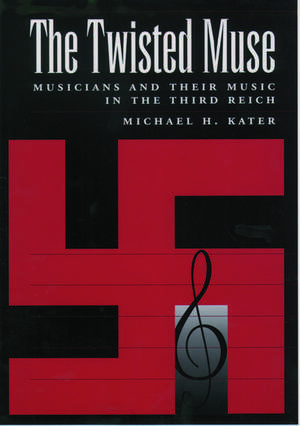The Twisted Muse: Musicians and Their Music in the Third Reich
Autor Michael H. Kateren Limba Engleză Paperback – 27 mai 1999
| Toate formatele și edițiile | Preț | Express |
|---|---|---|
| Paperback (1) | 276.31 lei 31-37 zile | |
| Oxford University Press – 27 mai 1999 | 276.31 lei 31-37 zile | |
| Hardback (1) | 980.68 lei 31-37 zile | |
| Oxford University Press – 10 apr 1997 | 980.68 lei 31-37 zile |
Preț: 276.31 lei
Nou
Puncte Express: 414
Preț estimativ în valută:
52.89€ • 57.47$ • 44.46£
52.89€ • 57.47$ • 44.46£
Carte tipărită la comandă
Livrare economică 09-15 aprilie
Preluare comenzi: 021 569.72.76
Specificații
ISBN-13: 9780195132427
ISBN-10: 0195132424
Pagini: 344
Ilustrații: black & white illustrations
Dimensiuni: 235 x 156 x 28 mm
Greutate: 0.54 kg
Ediția:Revised
Editura: Oxford University Press
Colecția OUP USA
Locul publicării:New York, United States
ISBN-10: 0195132424
Pagini: 344
Ilustrații: black & white illustrations
Dimensiuni: 235 x 156 x 28 mm
Greutate: 0.54 kg
Ediția:Revised
Editura: Oxford University Press
Colecția OUP USA
Locul publicării:New York, United States
Recenzii
The merit of the book lies in its detailed factual picture of the background for music and musicians in those troubled times.
A very readable and intriguing book for those interested in the impact of Nazism on cultural life in Germany.
Mr. Kater...has extracted masses of information from far-flung sources, including public and private archives in Germany and elsewhere, and has drawn level-headed, intelligent conclusions from his research....The broadest and clearest study of classical music in Hitler's Germany that has appeared to date....Mr. Kater's treatment of the complicated--and hotly debated--case of the conductor Wilhelm Furtwangler is thorough and convincing....A great deal more is packed into [this book], including fresh looks at the Wagner family's complicity with the Nazis and the cases of Paul Hindemith...and Herbert von Karajan....Anyone interested in the depressing but fascinating subject of art and politics will find this book exceptionally worthwhile.
Kater...has done prodigious primary research, much of it in hitherto unexamined files, to emerge with a mountain of fresh material....Anyone seriously interested in the interface of art and a peculiarly threatening political culture will find [this book] endlessly fascinating.
[Gives] more analytical attention to the entire [Nazi] era's secrets. Kater...has combed newspaper archives, studied economic statistics, interviewed surviving composers and meticulously correlated information from denazification proceedings. His account...is the most throrough and nuanced now available of Nazi musical alliances, allegiances and ambiguities....Brings us to a more complicated understanding without tolerating latent defenses of old friends or 'Vissi d'Arte' alibis.
Fills a conspicuous lacuna in 20th-century musicology. Kater...presents a detailed, disturbing, but always compelling account....There is a great deal here to engage scholars and professional musicians as well as general readers interested in the study of music and ideology. Highly recommended for all libraries.
The best source of information about conductors and other musicians in the Third Reich is now Mr. Kater's book, dense with facts, many of them newly unearthed.
[An] impressive new book...far and away the finest and canniest treatment of the Nazi musical nightmare to date, presents an excellent case study of two conductors who were judged not ideologically but aesthetically.
This absorbing study provides a painful reminder of the degree to which musicians were prepared to compromise their artistic integrity in order to appease the political hierarchy during the Third Reich.
This work, with its emphasis on the social and political nature of music and the political attitude of musicians during the Nazi regime, is the first of its kind. It will be of interest to scholars and general readers eager to understand Nazi Germany, to music lovers and to anyone interested in the interchange of music and politics, and culture and ideology.
...a well informed study of the state of serious or classical music....Kater is extemely knowledgable about the varieties of political allegiances deployed by the musical fraternity....[His] almost-encyclopedic study of these musicians' activities in the Third Reich reveals a great deal more than was hitherto documented about the least desirable sides of these men's characters.
The most authoritative account to date of music and musicians in the Third Reich.
This book bears many of the hallmarks of Kater's earlier work on jazz: resourceful research, copious documentation, straightforward writing, and a good working knowledge of music. Perhaps of even greater importance is that this book, like the one on jazz, succeeds brilliantly in conveying a sense of the ambiguities and contradictions of musical life in Nazi Germany...never before has the readiness of large numbers of German musicians, both major and minor, to acquiesce or cooperate actively in the purge of their colleagues, been as thoroughly and persuasively documented...offers fascinating portraits of several of the century's most important musical figures, such as Bruno Walter, Arnold Schonberg, Otto Kelmperer, and Kurt Weill. Kater has performed a valuable service by bringing their stories together in one place, integrating them into a study whose main focus is on what took place inside Germany's borders.
In assembling this material, Kater has surely written the definitive study of the musician in the Third Reich (carefully documented with sixty-nine pages of detailed notes). It will prove indispensable for students of the culture of the period.
A very readable and intriguing book for those interested in the impact of Nazism on cultural life in Germany.
Mr. Kater...has extracted masses of information from far-flung sources, including public and private archives in Germany and elsewhere, and has drawn level-headed, intelligent conclusions from his research....The broadest and clearest study of classical music in Hitler's Germany that has appeared to date....Mr. Kater's treatment of the complicated--and hotly debated--case of the conductor Wilhelm Furtwangler is thorough and convincing....A great deal more is packed into [this book], including fresh looks at the Wagner family's complicity with the Nazis and the cases of Paul Hindemith...and Herbert von Karajan....Anyone interested in the depressing but fascinating subject of art and politics will find this book exceptionally worthwhile.
Kater...has done prodigious primary research, much of it in hitherto unexamined files, to emerge with a mountain of fresh material....Anyone seriously interested in the interface of art and a peculiarly threatening political culture will find [this book] endlessly fascinating.
[Gives] more analytical attention to the entire [Nazi] era's secrets. Kater...has combed newspaper archives, studied economic statistics, interviewed surviving composers and meticulously correlated information from denazification proceedings. His account...is the most throrough and nuanced now available of Nazi musical alliances, allegiances and ambiguities....Brings us to a more complicated understanding without tolerating latent defenses of old friends or 'Vissi d'Arte' alibis.
Fills a conspicuous lacuna in 20th-century musicology. Kater...presents a detailed, disturbing, but always compelling account....There is a great deal here to engage scholars and professional musicians as well as general readers interested in the study of music and ideology. Highly recommended for all libraries.
The best source of information about conductors and other musicians in the Third Reich is now Mr. Kater's book, dense with facts, many of them newly unearthed.
[An] impressive new book...far and away the finest and canniest treatment of the Nazi musical nightmare to date, presents an excellent case study of two conductors who were judged not ideologically but aesthetically.
This absorbing study provides a painful reminder of the degree to which musicians were prepared to compromise their artistic integrity in order to appease the political hierarchy during the Third Reich.
This work, with its emphasis on the social and political nature of music and the political attitude of musicians during the Nazi regime, is the first of its kind. It will be of interest to scholars and general readers eager to understand Nazi Germany, to music lovers and to anyone interested in the interchange of music and politics, and culture and ideology.
...a well informed study of the state of serious or classical music....Kater is extemely knowledgable about the varieties of political allegiances deployed by the musical fraternity....[His] almost-encyclopedic study of these musicians' activities in the Third Reich reveals a great deal more than was hitherto documented about the least desirable sides of these men's characters.
The most authoritative account to date of music and musicians in the Third Reich.
This book bears many of the hallmarks of Kater's earlier work on jazz: resourceful research, copious documentation, straightforward writing, and a good working knowledge of music. Perhaps of even greater importance is that this book, like the one on jazz, succeeds brilliantly in conveying a sense of the ambiguities and contradictions of musical life in Nazi Germany...never before has the readiness of large numbers of German musicians, both major and minor, to acquiesce or cooperate actively in the purge of their colleagues, been as thoroughly and persuasively documented...offers fascinating portraits of several of the century's most important musical figures, such as Bruno Walter, Arnold Schonberg, Otto Kelmperer, and Kurt Weill. Kater has performed a valuable service by bringing their stories together in one place, integrating them into a study whose main focus is on what took place inside Germany's borders.
In assembling this material, Kater has surely written the definitive study of the musician in the Third Reich (carefully documented with sixty-nine pages of detailed notes). It will prove indispensable for students of the culture of the period.
Notă biografică
Michael H. Kater is Distinguished Research Professor of History at the Canadian Centre for German and European Studies at York University, Toronto, and a Fellow of the Royal Society of Canada. He is also the author of Different Drummers: Jazz in the Culture of Nazi Germany (OUP, 1992).


















